|
|
CissusFamily: Vitaceae.
| Cissus rhombifolia |
Common name(s): Kangaroo vine, Grape ivy |
|
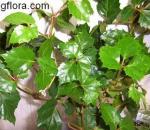 |
Genus of about 350 species of evergreen perennials, shrubs, and climbers, some with succulent stems or roots, occuring in tropical and subtropical regions, at forest margins and thickets. Cissus are vining plants suitable for hanging pots or for training on a trellis. They prefer medium light intensity but tolerate shade for short periods of time. Maintain an evenly moist soil during the growing season but give less water in winter. Ideal temperatures are 50 to 65 F at night and 70 to 85 F during the day. In winter, Cissus prefer slightly lower temperatures. If subjected to high summer temperatures, provide supplemental humidity. Repotting may be done in spring or summer. March is the best time to prune. |
|
| Growing conditions |
Watering and misting |
Propagation |
| Average warmth in summer - minimum 45-55 F in winter. Brightly lit spot away from direct sunlight. Grow in soil-based potting mix. |
Keep compost moist at all time. Reduce watering in winter. Misting is necessary. |
Take hardwood or greenwood stem cuttings in spring or summer. |
|
Cissus amazonica |
|
|
Climber with red stems and tendrils. Leaves are lance-shaped, with heart-shaped bases, green and gray above, maroon beneath. |
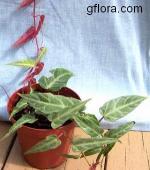 |
|
Cissus antarctica Vent. |
|
|
Climber with tendrils and broadly ovate, toothed, lethery, glossy, green leaves. |
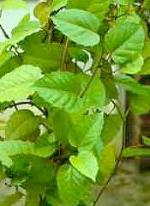 |
|
Cissus cactiformis |
|
|
Climbing 4- or 5-angled stems 4-5 cm in diameter; stems winged and
constricted at nodes from which adventitious roots develop; leaves
caducous; inflorescence 20 cm long; yellowish-green flowers. |
 |
|
Cissus discolor Planch. |
|
|
Slender climber with red stems and tendrils. Leaves are ovate to lance-shaped, with heart-shaped bases, dark-green, zoned silver, gray, or pink above, and maroon beneath. |
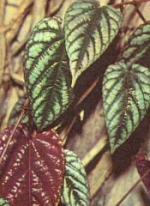 |
|
Cissus quadrangularis |
|
|
Few-leaved, succulent climber with tendrils, thick, 4-angled stems, and thinner, wavy-margined, horny branches constricted at the nodes. Entire to 3-lobed, ovate to triangular, coarsely toothed, green leaves, up to 8in (20cm) long, develop from the nodes and opposite to tendrils. |
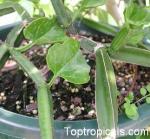 |
|
Cissus rhombifolia Vahl (Rhoicissus rhomboidea hort. non Planch) var. "Ellen Danica" |
|
|
Leaflets are deeply lobed. Plant size - up to 3ft (1m). |
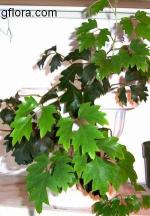 |
|
Cissus rotundifolia |
|
|
Cissus rotundifolia (Arabian Wax Cissus, Peruvian grape ivy) comes from East Africa. It has green stems with almost round leaves. The leaves are fleshy, waxy, toothed and of a deep green colour. They are about 6-8 cm in diameter and are slightly heart shaped at the base. Tendrils arise opposite young leaves and the plant climbs on supports with their help.
The Arabian Wax Cissus needs very little water. |
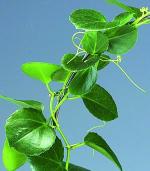 |
|
Cissus tuberosa |
|
|
Caudex swollen; stems with thick internodes, long tendrils and aerial
roots; leaves 5-10 cm long, palmate; flowers greenish-yellow. |
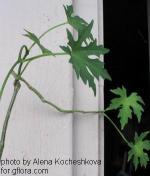 |
|
These materials are freely provided for instructional and educational purposes. Any duplication or publication of text or images herein for commercial gain without explicit written permission of the owner or photographer constitutes breach of trust and violation of copyright.
Copyright © Galka Okhapkina 1998-2026








